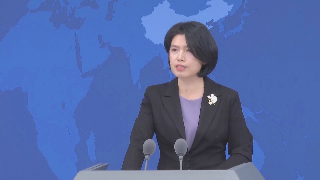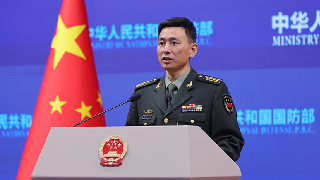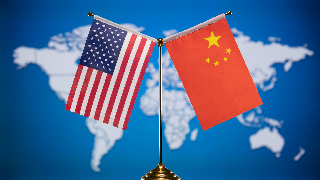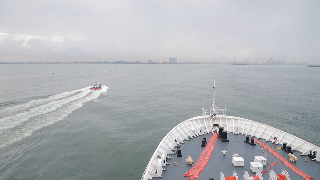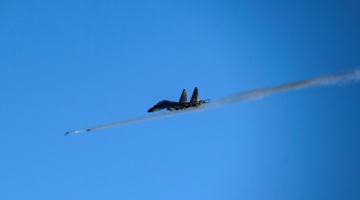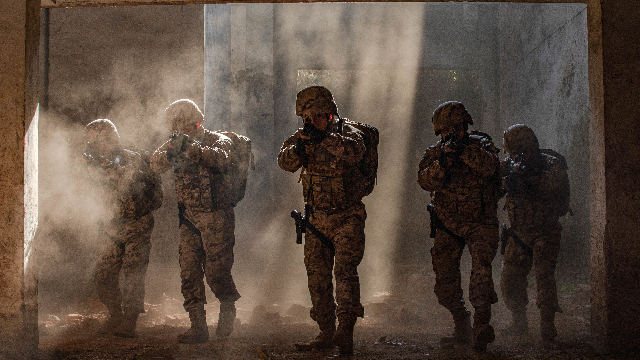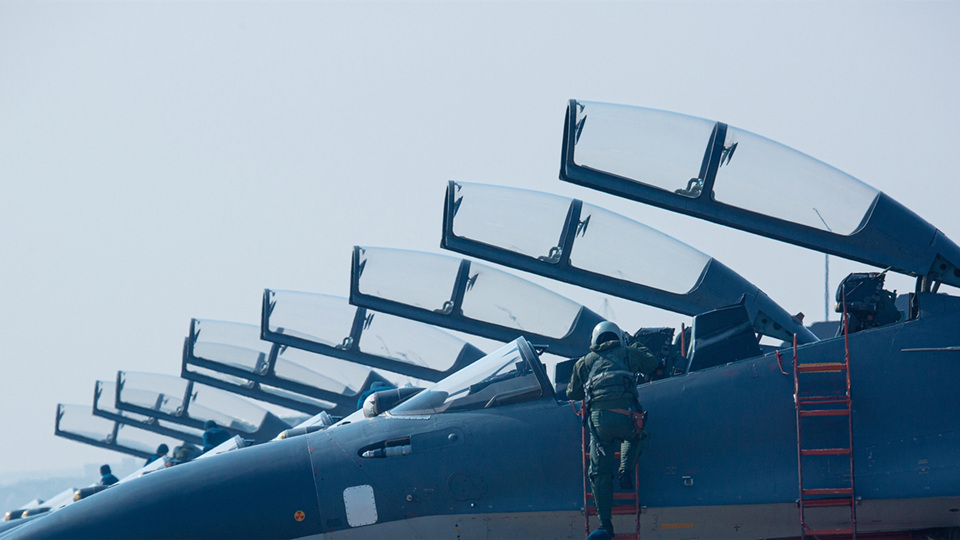On the afternoon of July 12, spokesperson for the Ministry of National Defense Senior Colonel Zhang Xiaogang answered recent media queries concerning the military.
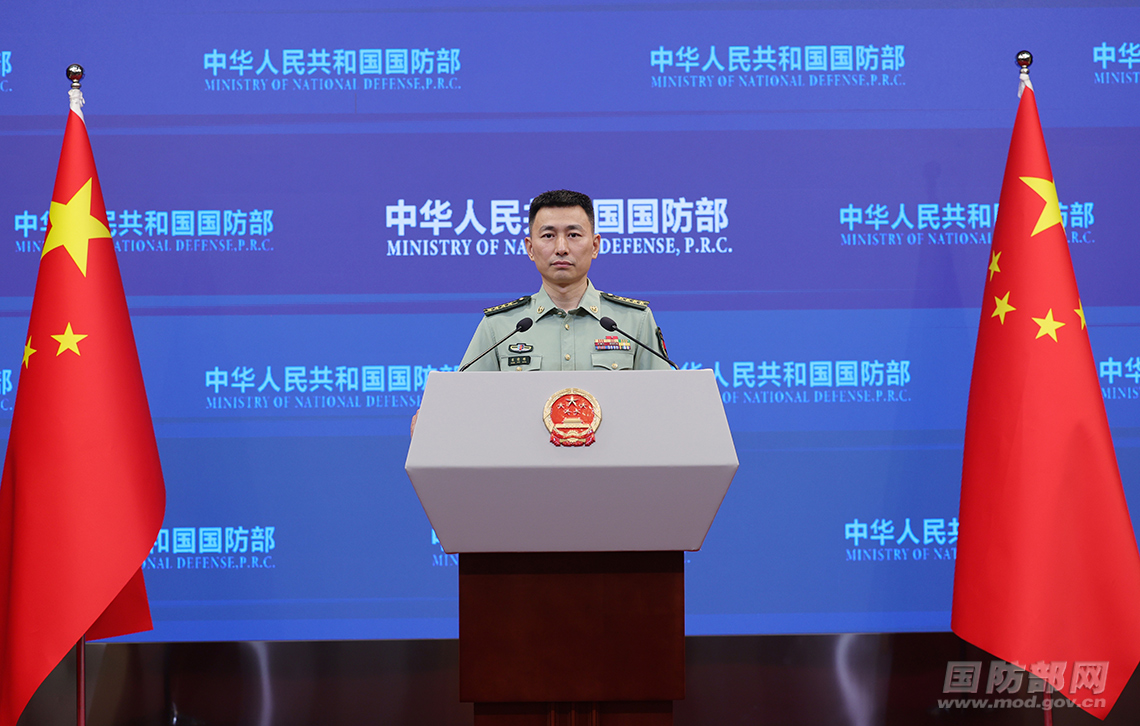
Senior Colonel Zhang Xiaogang, spokesperson for the Ministry of National Defense (MND) of the People's Republic of China (PRC), answers recent media queries concerning the military on the afternoon of July 12, 2024. (mod.gov.cn/Photo by Li Xiaowei)
(The following English text is for reference. In case of any divergence of interpretation, the Chinese text shall prevail.)
I have six pieces of news on the top.
The first one.
The 11th Beijing Xiangshan Forum will be convened in Beijing from September 12 to 14. The theme of this year's forum is Promoting Peace for a Shared Future. So far, the Chinese side has sent invitations to official delegates from over 100 countries and international organizations as well as to security experts and scholars at home and abroad. The preparation for the forum is well underway. We welcome delegations from different countries to attend the forum, and both domestic and foreign journalists are also welcome to cover it.
The second one.
According to China-Russia annual military engagement plan and bilateral agreement, the two militaries started Exercise Joint Sea-2024 in the waters and airspace near Zhanjiang City in early July. The ongoing exercise, scheduled to last until around mid-July, is to demonstrate the resolve and capabilities of the two sides in jointly addressing maritime security threats and preserving global and regional peace and stability. It will further deepen China-Russia comprehensive strategic partnership of coordination for the new era.
The third one.
According to bilateral agreement and China-Vietnam annual military engagement plan, the Chinese People's Armed Police Force and the Mobile Police Force of the Vietnamese Ministry of Public Security will carry out Cooperation-2024 joint counter-terrorism training in Nanning, Guangxi Zhuang Autonomous Region, from late July to early August. The subject of the training is joint counter-terrorism operations. It will provide a good opportunity for the two sides to exchange best practices on counter-terrorism training, and will enhance mutual understanding and trust.
The fourth one.
The PLA Dalian Naval Academy will host the Navy Cup International Regatta & International Midshipmen Week from July 19 to 25. Teams from naval academies of Brazil, Italy and Pakistan, as well as eight teams from Chinese naval academies will participate. The theme of this year's Navy Cup is "Confidence, Openness, and Win-Win Cooperation". Highlighting the culture of "ocean, sea power, and navy", the event will include activities such as academic exchanges and seminars, visits to military and civilian venues, experience of traditional Chinese culture, and sports games, etc. It is aimed to promote exchanges between midshipmen from Chinese and foreign military academies, promote international cooperation between academies, enhance the military competence of Chinese and foreign midshipmen, and strengthen their combat readiness, teamwork spirit, and commitment to the navies.
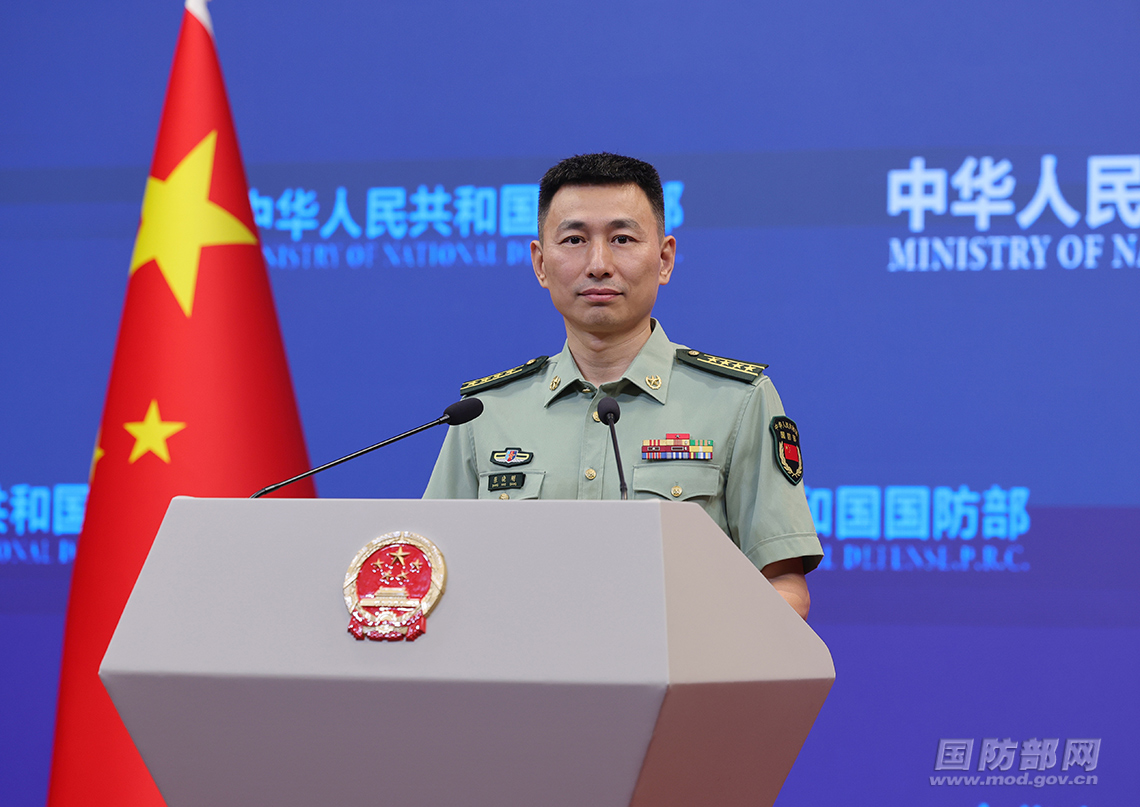
Senior Colonel Zhang Xiaogang, spokesperson for the Ministry of National Defense (MND) of the People's Republic of China (PRC), answers recent media queries concerning the military on the afternoon of July 12, 2024. (mod.gov.cn/Photo by Li Xiaowei)
The fifth one.
The 2024 Western Pacific Naval Symposium (WPNS) Humanitarian Assistance and Disaster Relief Seminar and Tabletop Exercise (TTE) was held in Guangzhou from July 8 to 11. Delegates from 16 member states and 6 observer states attended the event. The scenario of the TTE is joint humanitarian assistance and disaster relief operations in response to typhoon. Mixed teams (team members are from different countries) were formed and given such tasks as the establishment and efficient operation of multinational coordination centers (MNCCs) on short notice, and the issuing of orders to conduct search and rescue operations at sea and relief operations on land. Such subjects as offshore and onshore search and rescue, personnel evacuation and settlement, relief engineering, medical assistance, and epidemic prevention were covered. The PLA Navy stands ready to join hands with its international counterparts in promoting global and regional maritime governance, and in jointly tackling maritime security risks and challenges, so as to build a maritime community with a shared future.
The sixth one.
The PLA Army Logistics Academy held the International Seminar on Military Expenditure and Management in Chongqing on July 11. Representatives from countries including Armenia, Ghana, South Africa and the US participated online, while personnel from over ten Chinese military and civilian units attended in person. Under the theme of "Military Expenditure, Governance and Performance", the participants shared with each other their research findings and experience, and explored innovative ideas and approaches to manage military expenditure under the global situation in the new era.
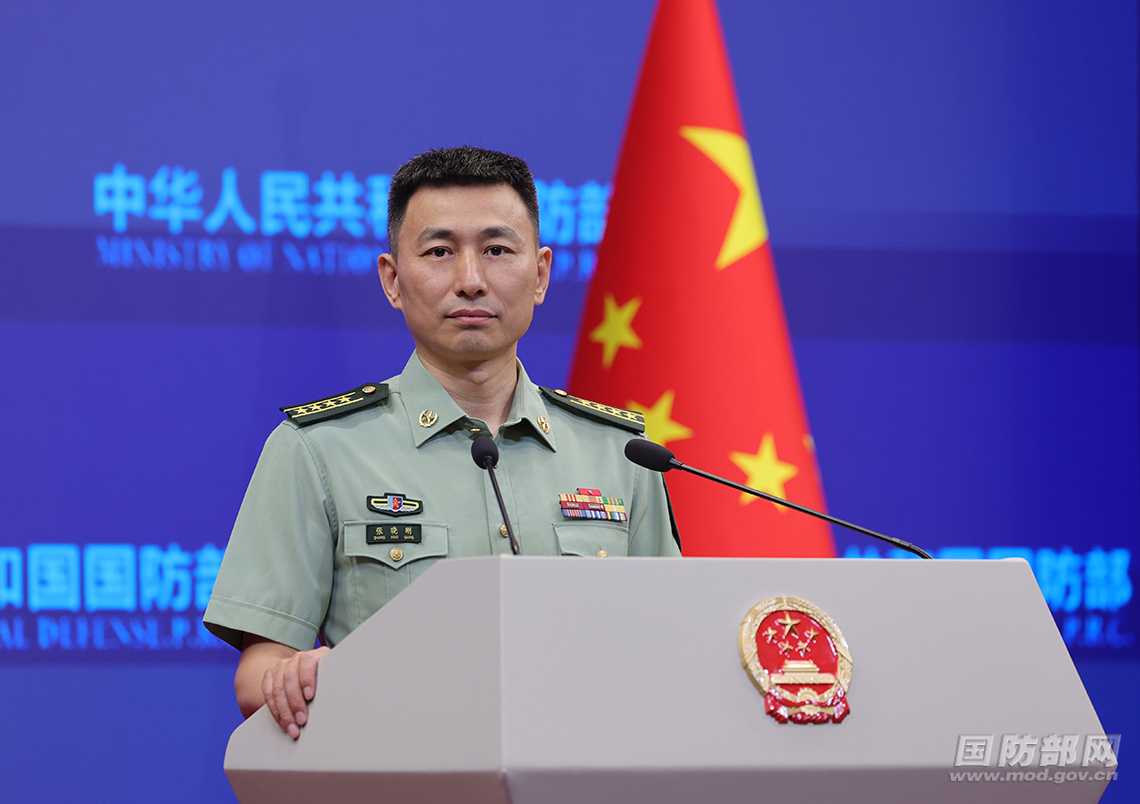
Senior Colonel Zhang Xiaogang, spokesperson for the Ministry of National Defense (MND) of the People's Republic of China (PRC), answers recent media queries concerning the military on the afternoon of July 12, 2024. (mod.gov.cn/Photo by Li Xiaowei)
Question: President Xi Jinping recently attended the 24th Meeting of the Council of Heads of State of the Shanghai Cooperation Organization (SCO) in Astana, Kazakhstan and delivered an important speech. China assumed the rotating presidency of the SCO after the Astana Summit. Would you please tell us more about the PLA's participation in defense and security cooperation under the SCO framework?
Zhang Xiaogang: The latest SCO Summit in Astana approved Belarus as an official member, driving the number of SCO member states to ten. Taking over the rotating presidency, China is ready to make greater contributions to the SCO. In recent years, defense and security cooperation within the framework of the SCO has yielded rich results under the leadership of the heads of state of its members. First, continuously strengthening strategic communication between member states. Defense ministers' meetings have been held on a regular basis. In late April this year, Chinese Defense Minister Dong Jun attended the SCO Defense Ministers' meeting and held talks with his foreign counterparts, calling for jointly implementing the Global Security Initiative and promoting solid and pragmatic defense and security cooperation. Second, more exchanges through institutionalized meetings. The Chinese side has consistently participated in SCO meetings of heads of SCO defense ministries' departments of international military cooperation and meetings of expert work groups. These meetings has provided SCO members platforms to communicate with representatives from other parties on issues including international and regional security and the development of SCO's defense and security cooperation. A series of consensuses on cooperation among relevant countries have been reached. Third, productive and substantive cooperation. The defense departments and militaries of SCO members have conducted exchanges and mutual learning in such professional domains as military procuratorate, military medicine, military transport, and humanitarian rescue and relief. In November 2023, the Chinese side hosted the 5th SCO Defense and Security Forum, making positive contributions to the development of the organization's defense and security cooperation.
The Chinese military is willing to work with the militaries of other SCO members to promote the Shanghai Spirit, deepen defense and security cooperation, and build a closer SCO community of shared future, thus making greater contributions to peace and development in the region and beyond.
Question: It is reported that China and the UAE are holding the "Falcon Shield-2024" joint air force training in Xinjiang, the second of its kind. Please tell us more about the joint training and the mil-to-mil relations between the two countries.
Zhang Xiaogang: The China-UAE "Falcon Shield-2024" joint air force training is ongoing. The participating troops are having in-depth professional exchanges and training to enhance their technical and tactical competence. In recent years, the Chinese and UAE militaries have witnessed productive cooperation in areas including high-level exchanges, joint exercises, personnel training, and professional exchanges. The Chinese military will make joint efforts with the UAE side to earnestly deliver on the consensus reached by the two heads of state, increase strategic mutual trust, and deepen pragmatic cooperation in various domains, so as to elevate the mil-to-mil relations to new heights.
Question: It is reported that commercial satellite images show that the PLAN aircraft carrier Shandong appeared in waters near the Philippines. Some analysts commented that "China's first-ever dispatch of an aircraft carrier to waters near the Philippines is a move of deterrence." Could you please comment on that?
Zhang Xiaogang: The recent far-seas realistic training of the aircraft carrier Shandong task group in relevant waters is a routine arrangement included in its annual training plan. It complies with international law and practices, without targeting any specific entity. In the future, the PLA Navy will organize similar exercises and training regularly to continuously enhance the systemic combat capability of aircraft carrier formations.
Question: Not long ago, China Coast Guard vessels carried out tracking, monitoring and control measures against actions by the Philippines to transfer personnel and supplies to its Coast Guard ships illegally stationed at Xianbin Jiao. Later the Philippine side claimed that they could do anything they want within their exclusive economic zone. What's your comment?
Zhang Xiaogang: China has indisputable sovereignty over Nansha Qundao, including Xianbin Jiao. The law enforcement operations of the Chinese side are legitimate and justified. Relevant actions of the Philippine side seriously violate China's sovereignty and the Declaration on the Conduct of the Parties in the South China Sea (DOC), particularly Article 5. Such actions have created new tensions in the South China Sea and further undermined regional peace and stability. We urge the Philippine side to immediately withdraw its personnel and ships, and stop heading down the wrong path.
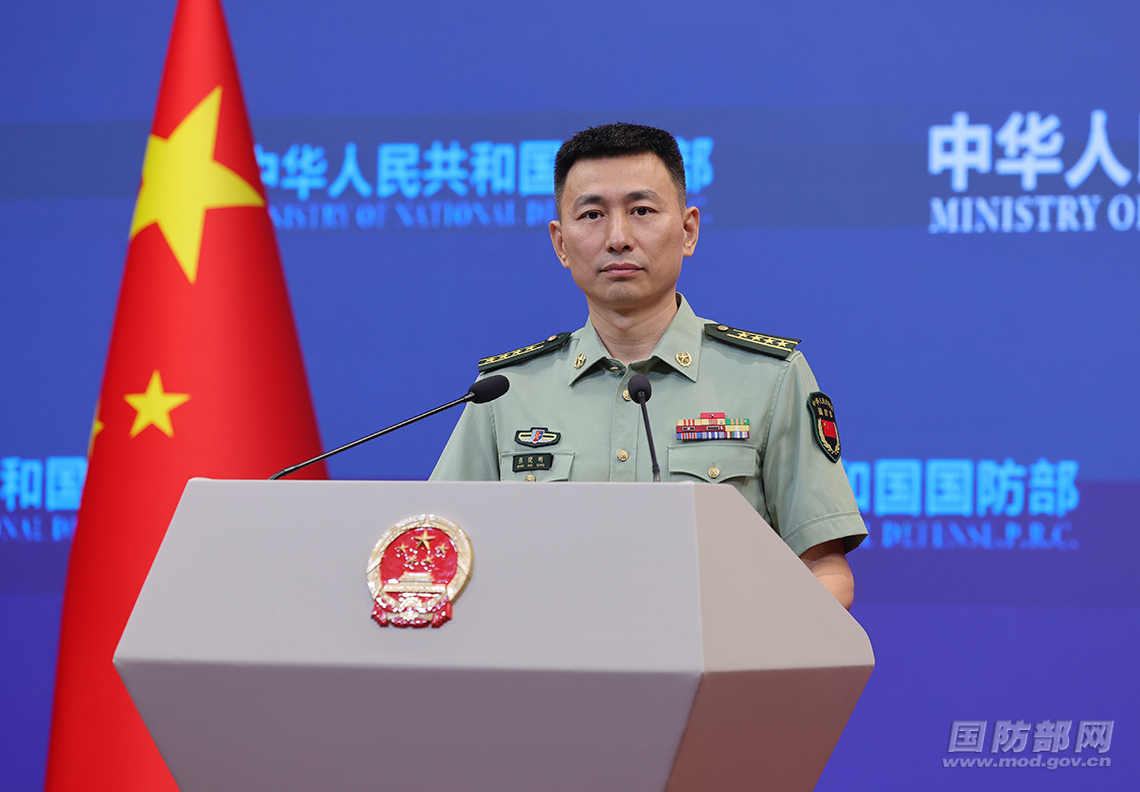
Senior Colonel Zhang Xiaogang, spokesperson for the Ministry of National Defense (MND) of the People's Republic of China (PRC), answers recent media queries concerning the military on the afternoon of July 12, 2024. (mod.gov.cn/Photo by Li Xiaowei)
Question: It's reported that the spokesperson of the Armed Forces of the Philippines recently said the US is currently shipping out its equipment used during annual joint exercise Balikatan. As per plan, the land-based Mid-Range Capability missile system Typhon deployed in the Philippines will be pulled out of the country in September or even earlier. Philippine troops have been taught how to use and maintain the Typhon missile system, but it was not employed in live-fire exercises. Do you have any comment?
Zhang Xiaogang: We have noted relevant reports. The US mid-range missile system is a strategic offensive weapon reminiscent of the Cold War. It should never have been deployed in this region. The US and the Philippines should honor their words, immediately pull out the system and never deploy it again. In recent years, the US side has withdrawn from multiple arms control treaties or organizations, which greatly undermined the international arms control and disarmament process. Forcing its allies and partners onto the US war chariot will only lead to tensions and confrontation, and undermine regional peace and stability. The Chinese side is firmly opposed to this approach. We urge the US and the Philippines to respect the aspirations of peoples in the region for peace and development, and do more for regional peace and stability.
Question: It is reported that the Self-Defense Fleet Command of the Japan Maritime Self-Defense Force (JMSDF) is exploring a "sister unit" partnership with the Philippine Navy. The aim is to check the Chinese Navy's attempts to "change the status quo by force in the South China Sea". Meanwhile, Japan and the Philippines have signed the Reciprocal Access Agreement (RAA), which allows them to deploy troops to each other's territory. Could you please comment on that?
Zhang Xiaogang: It is our consistent position that defense cooperation between relevant countries should neither target any third party or harm any third party's interests, nor damage regional peace and stability. It must be noted that Japan is not a party directly involved in the South China Sea issue, and therefore is in no position to meddle in the maritime disputes between China and the Philippines. It is exactly the Philippines who relies on external forces to create trouble, and outside countries who stick their noses where they do not belong, that are changing the status quo in the South China Sea and aggravating regional tension. Japan keeps pointing fingers at China as an excuse to create tension, build up its own military forces, and gang up for bloc confrontation. Given that Japan made up excuses to launch wars of aggression multiple times in the past, the international community should stay highly alert against the possibility of Japan once again taking the wrong path of militarism.
Nanhai Zhudao is China's inherent territory. The Chinese side will resolutely safeguard our sovereignty, security and maritime rights and interests with stronger capabilities and more reliable means.
Question: It's reported that Taiwan's military sent letters to local temples and churches, asking for permission to use them as ammunition depots in war time. This has sparked backlashes in some cities and counties. What's your comment?
Zhang Xiaogang: We have noted relevant reports. The DPP authorities are obstinate in seeking "Taiwan independence" by force. Their attempts to use religious sites in wartime and turn local residents into human shields are appalling. National reunification is the right way forward, while "Taiwan independence" only leads to a dead end. Separatists for "Taiwan independence" will be caught no matter where they hide, and any scheme to resist reunification by force will fail.


